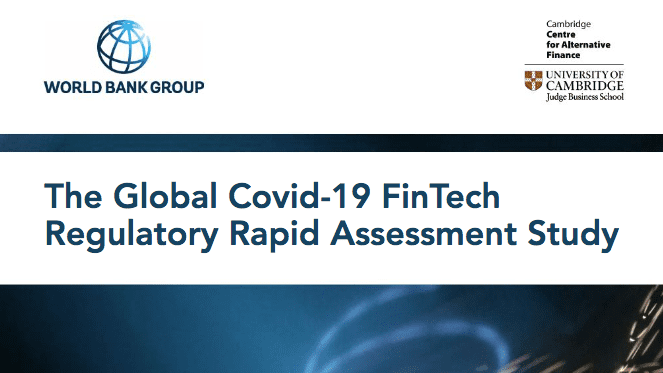Cambridge Centre for Alternative Finance and World Bank Release Global COVID-19
The World Bank and University of Cambridge report highlights the increasing digitization of financial services that has accelerated the pace of regulatory innovation during the pandemic
Views:
20

The Cambridge Centre for Alternative Finance (CCAF) has become the world leader in fintech research, known for their thorough reports on most areas of alternative finance. This year, with the pandemic raging, they undertook their most ambitious project yet. Together with the World Bank the CCAF have published the Global COVID-19 FinTech Regulatory Rapid Assessment Study which was released today (download full study here).
The goal of the study was to shed light on the current state of the global fintech market and provide timely data to inform decision-making by market participants, regulators and policymakers. The survey may well be the most ambitious regulatory survey ever undertaken in the history of fintech. They gathered responses from 118 financial regulators (including central banks) in 114 jurisdictions across the globe. The regulators that responded from the U.S. included the Federal Reserve Board, the Commodity Futures Trading Commission, the Financial Industry Regulatory Authority and the Wyoming Division of Banking.
The study found that the vast majority (72%) of regulators had either accelerated existing regulatory innovation initiatives or introduced new initiatives. Not one regulator reported the cancellation of an innovation initiative due to Covid-19 but some indicated they had delays.
Almost two-thirds of regulators from emerging markets and developing economies said that fintech has increased in priority while more than half of regulators in advanced economies said it has remained high. Interestingly, central banks are more likely (at 65%) to have increased the prioritization of their fintech work relative to other financial regulators (at 38%).
The increased use of fintech products have been observed by 60% of fintech regulators, particularly in the case of digital payments and banking. At the same time regulators see an increased risk in the fintech market during the pandemic concerning cybersecurity (78% referencing as a top three risk), operational risks (54%), consumer protection (27%) and fraud and scams (18%).
Most regulators think they are doing a good job during the pandemic as 80% felt that they have been resilient and adaptable in their response to the challenges of Covid-19. At the same time, they identified key internal challenges when it comes to the regulation and supervision of fintech activities.
Bryan Zhang, the Executive Director and Co-Founder of the CCAF said of the study:
Global challenges such as COVID-19 require global efforts and local solution. We hope that the global regulatory community will find this empirical study immediately and practically useful in facilitating policy learning, formulating regulatory innovation initiatives and informing evidence-based regulation, both during the pandemic and beyond.
Caroline Freund, Global Director of Trade, Investment and Competitiveness at World Bank Group had this to say:
This research was undertaken in order to better understand the experiences of regulators as they face the impact of COVID-19 and increased utilisation of digital financial services and fintech. The findings show that COVID-19 has in many cases accelerated policies and programmes that support a shift to digital finance, such as innovation offices and regulatory sandboxes.
The study concludes with seven lessons learned based on the data collected from this rapid assessment survey, both short term and long term considerations. At the end of the day regulators the world over recognize the importance that fintech has to their economy and recognize they need to do a better job in supporting the transition to a digital infrastructure for finance.














